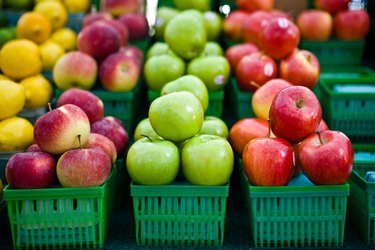
If you're planning your diet based on the glycemic index, or GI, of foods, you can add a fresh apple to a meal or snack without causing a marked increase in your blood sugar. The carbohydrates in a food determine how that food will affect your blood glucose levels. Relative to their carbohydrate content, apples contain a high volume of water and fiber, which means that you'd have to eat a lot of apples to raise your blood sugar significantly.
Glycemic Effect
Video of the Day
The GI assigns a value to carbohydrate-containing foods based on their effects on the blood glucose levels of human test subjects. Foods that rank high on a scale of one to 100 can raise blood sugar quickly and significantly. Foods that rank low on the scale have a slower, less marked effect on blood sugar. The GI values for the apples tested by the Glycemic Index Foundation range from 28 to 44. The type of apple, the ripeness of the fruit and other factors may affect its GI value, according to the American Diabetes Association, or ADA. On average, this fruit falls into the lower end of the GI.
Video of the Day
Soluble Fiber
The fiber content of a food can affect its GI value, according to the ADA. The 4 g of fiber in one apple includes soluble fiber, which dissolves into a jelly when added to water. After you eat an apple, its fiber turns into a gelatinous mass that slows down the conversion of its carbohydrates into glucose, a form of sugar that your body uses for energy. Because of this delay in digestion, many foods that are high in soluble fiber have a low GI, the Glycemic Index Foundation notes.
Carbohydrates and Water
One medium apple has 25 g of carbohydrate, according to the U.S. Department of Agriculture, or USDA. This 25 g of total carbohydrate includes 4 g of fiber, 4 g of glucose, 4 g of sucrose and 11 g of fructose. Foods that are high in fructose tend to have a low GI value, according to the Glycemic Index Foundation. Apples are also high in water, which increases a food's volume without adding to its caloric content. A medium apple weighing 182 g has 156 g of water, according to the USDA. The water in apples can create a sensation of fullness without having any impact on your blood sugar.
Glycemic Load
The glycemic load, or GL, takes into account both the carbohydrate content of a food and the ability of those carbohydrates to increase your blood sugar. One raw Braeburn apple has a GI value of 32, according to the Glycemic Index Foundation. This apple has 13 g of carbohydrates per 120-g serving and a low GL of 4. The low GL of apples means that they have a low glycemic potency, the Glycemic Index Foundation notes. If you're monitoring your blood sugar levels or trying to lose weight, apples provide filling, nutritious volume that may satisfy your appetite while keeping your blood sugar stable.